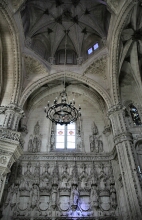History of Christmas Carols
Tracing Christmas carols history is tracing the decline of church religious authorities in the affairs of man. The clergy used to dictate not only religious but also state dealings in medieval ages. Thus, with church hymns and hymnals as with other elements of church rituals and activities, the approval of church court was required.
[ads location=”page_1″]
Modernization of Christmas carols history came with the reforms introduced by St. Francis of Assisi during the 12th century when the songs leaned to the joyous taste of the masses than with somber traditional hymns. Modern noels backslid with the banning in the Protestant England by Oliver Cromwell. Their popularity came back during the Victorian period, but many of the traditional songs have already been lost and forgotten.
Secular compositions in Christmas carols history became more popular in the 19th century with the help of secular media such as records, tapes, television, radio and cinema. Commercial activities bolstered by advertising and the recent growth of internet and computer media forever left the task of Christmas composition to the control of the common people. Thus, carols no longer have absolute religious connotations.
[ads location=”page_2″]
The verse-refrain pattern has been superseded by modern genres in Christmas carols history. The elaborate arrangements significant of classical music have not been added to the modern Christmas songs. It no longer involves a saint, the Christ child or the Virgin Mary, but with commonplace themes that even reach the absurd and funny.
The Christmas traditions on carols in history have forever changed to the secular peasant tradition of the times. It probably is an acknowledgement of the folk customs which constitute the foundation of ancient winter traditions of the pagan religions. Whether the struggles of the Christian church to superimpose Christianity over pagan customs failed or not is an individual view. The minstrels of Christmas carols history no longer trudge the dusty road, but the modern equivalents to their songs travel the airwaves and the internet highways with greater influence than even the oligarchic medieval clergy.
[ads location=”page_3″]
Related:
[links category_name=”gift2″]




